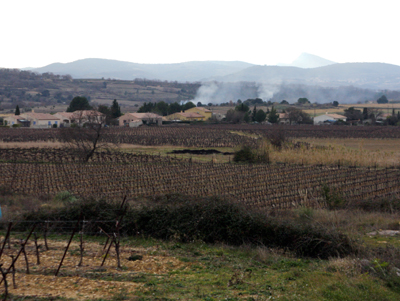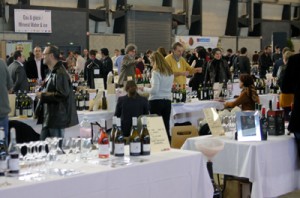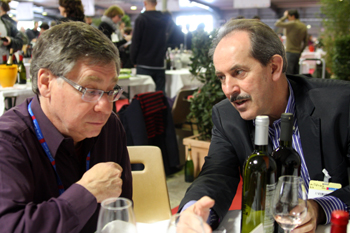There’s no better way to stir up a heated argument with serious wine lovers than introduce natural wine, organic wine, or sulfites into the discussion.

Recent regulation changes in Europe and then a U.S. agreement on organic products, excluding wine, have stirred an on-going debate about organic wine, sulfites, and a increasingly controversial U.S. sulfite standard.
A week-long January visit to Montpellier, France, for the 19th annual Millesime Bio, an organic wine trade show, found surprising unanimity the argument is much ado about little. French winemakers in the Languedoc, the country’s biggest organic region, said the real issue is wine quality and the environment. They bristle when reminded of U.S. regulations, which require organic wines to have zero sulfites in order to be called organic.

“There is a bad image of organic wines in the United States which may have something to do with American winegrowers who don’t want French wine growers exporting more wine,” said Thierry Julien, President of the AIVB, the Languedoc’s organic wine growing organization and host of the Millesime Bio. “That may be part of the problem. There is something fishy.”
Julien, who presided over the trade show of 587 wineries from 13 countries, is frustrated and at the same time dismissive of U.S. regulations. “They maintain that an organic wine is a wine without sulfites,” he said in his small office at St Bauzille de la Sylve, France. “The fact is you’re an organic wine whether you add sulfites or not. There are sulfites in wine anyway because of the soil.”
The debate raged again Feb. 8 when the European Commission issued a press release outlining new rules for “organic wine.” In short, the EU rules restrict the amount of sulfites but allow red wine to contain up to 100 parts per million (ppm) and still be called organic. The U.S. regulations allow for just a minimal 10 ppm and carry the organic label. By comparison, conventionally produced wines are allowed up to 350 ppm. Starting with the 2012 vintage, European wineries may use the term “organic wine” instead of “wine made with organic grapes.”
Sulfites occur naturally in wine and are added to kill any bacteria which may occur in the winemaking process. Without sulfites, wine will not age and turn to vinegar as quickly as six months. Sulfites are often blamed for “red wine headache” but research has yielded no persuasive medical evidence between headaches and sulfites. While some people can have allergic reactions to sulfites, the number of reported cases is very small. Additionally, sulfites can be found in hundreds of food products which do not require a “Sulfites Added” label.

French wine makers were delighted with the new organic rule only to be frustrated a few days later when the EU and the U.S. Food and Drug Administration announced a bilateral agreement on organics. Essentially, the agreement was that any product meeting organic definitions grown on one side of the Atlantic could also carry the organic label on the other—except for wine.
“The EU wine producers should be angry they cannot export ‘organic wine’ to the U.S., the world’s largest wine consumer and importer,” said Paulo Bonetti, President of Organic Vintners in Boulder, CO. “I am writing a letter to the president and legal counsel of AIAB (Associazione Italiana per ‘Agricoltura Biologica), and a dozen Italian organic wine makers, requesting they lobby and fight the EU regulations and the National Organic Program to allow these organic products to be exported into the U.S. as ‘organic’ with the EU organic seal.
“This equivalency agreement is to promote the growth of organic agriculture and the growth of trade but wine is being left behind with no allowance for growth, neither from a marketing, sales, or agricultural perspectives.”

For a négociant like Jacques Frelin, whose family started the Languedoc’s organic wine movement in the mid-60s, the only pertinent argument is quality.
“Americans need to move beyond their obsession with sulfites,” said Frelin, owner of TerriorS Vivants, which exports wine to the U.S. “They need to put quality first. We try to use as little sulfites as we can. But we must have the ability to use sulfites if we want the markets to accept the wine.
“There is a difference in taste 99 percent of the time. You can find good wines without sulfites and it tastes good in the cellar. But you take it to your home and open it six months later and the wine is totally different. People who taste wines without sulfites are going to be disappointed when they taste it. They don’t come back and buy this wine.”
Frelin, a leading spokesman fluent in English, said sulfites just confuse the discussion. “Organic wine is wine without chemical products, it’s not wine without sulfites. People who don’t want sulfites in organic wines are against the organic wine movement. We work harder (than traditional wine growers) to make our products. You can work less and put some chemical products in to solve your problem but our way is to root out the problems first.”
The line in the sand tying the sulfite argument into organic wine occurred in the 1980s. Veteran organic importers like Veronique Raskin, San Rafael, CA., and Paul Chartrand, Rockland, Maine, call the convergence a terrible coincidence.

“U.S. regulations requiring sulfite labels on wine (1987) came out very shortly after the birth of organically grown wines,” Chartrand explained. “Everybody thought they were linked and they were not. At that time, almost every producer in world made wine from organic grapes with added sulfites. It changed when the warning came out.
“That began a long 20-year debate in people’s minds. It’s too bad. It’s almost coincidental because otherwise people would never have asked about it.”
Many believe the 1987 sulfite ruling was triggered by anti-alcohol forces trying to add a health scare to alcohol consumption.
Chartrand and Raskin express frustration at two decades of confusion. “We were talking about agriculture and the difference between growing plants in soil nourished naturally over the years, vines that picked up the micro-nutrients in the soil and expressed them in the grapes,” Chartrand said. “We were talking about grapes that weren’t sprayed with chemicals so the skins retain their natural qualities. We were talking about a wine that comes out of a natural living eco-system that expressed terroir.
“If you’re not interfering with any outside influence, you’re going to have the most accurate terroir. It has nothing to do with the cellar and whether you add sulfites or not.”
Raskin, who has imported organic wine since 1980 for The Organic Wine Company, is far more blunt than Chartrand.
“It’s been pretty ridiculous, verging on the obscene,” Raskin said. “The organic wine industry is a very large cause worthy of defending and promoting and it has been mired into this non-issue called sulfites. It has been elevated to the status of a big issue through disinformation, promulgated through well-meaning idiocy and fear mongering.”
Raskin contends all U.S. organic producers were on the same page until the early 1990s. “It became an issue only after it was clear that it could be financially beneficial to a very, very few,” she said. “Originally all winemakers (including some who object now) were in agreement that quality had to be the number-one priority. And in order for quality to be achieved on a consistent basis, everyone agreed that a certain amount of sulfites had to be added to organically grown grapes if the industry was to expand.”
Then in the early 90s a few U.S. producers were experimenting with sulfite-free wine, Raskin said. Those few saw the opportunity squeeze out sulfite-added producers. “We need to keep sulfites out of organic wine to keep the big guys out of it,” Raskin recalled being told on numerous occasions.
“Greed, contrary to Michael Douglas, is not good, for anybody actually,” Raskin said, “and especially if you’re promoting yourself as an organic producer and respectful of the earth. What I’ve observed over the past 25 years is at least shameful if not obscene. The time wasted defending something that is not worth defending is really heartbreaking. This has benefited a half a dozen wineries, bravo! But it has harmed 100 percent of the well-meaning winemakers around the world wanting to export to the United States.”
Despite building momentum, a change may not be forthcoming soon. As Palate Press columnist Blake Gray, who has consistently reported on the topic, wrote Dec. 7 after another ruling affirming the no-sulfties standard: “The National Organic Standards Board voted 9-5 to continue to prohibit sulfites from being added to ’organic wine.’ This came after the NOSB handling committee, which better understood the issue, voted 5-0 in October to support the inclusion of sulfites in organic wine.”
 Howard W. Hewitt is a former career journalist who writes a bi-weekly column about value wine for 17 Midwestern newspapers. Visit his blog, Grape Sense – A Glass Half Full.
Howard W. Hewitt is a former career journalist who writes a bi-weekly column about value wine for 17 Midwestern newspapers. Visit his blog, Grape Sense – A Glass Half Full.
